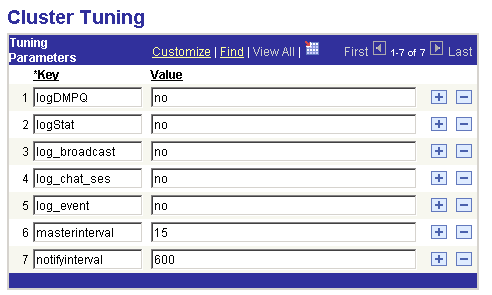Tuning PeopleSoft MCF Cluster Parameters for a Third Party
This section discusses how to tune PeopleSoft MCF cluster parameters for a third party. Tuning cluster parameters may give you better performance. To tune cluster parameters, use the Cluster Tuning (MCF_TP_SYS_NV_CMP) component.
Access the Cluster Tuning page using the following navigation path:
This example illustrates the cluster tuning parameters on the Cluster Tuning page.

Use the Cluster Tuning page to set MCF cluster parameters to optimize performance or enable logging for a cluster.
If you make changes to a cluster parameter, you must use the third-party Notify Cluster page to propagate the changes.
See Notifying Third-Party Clusters of Changed Parameters.
The following table lists the cluster tuning parameters you can modify and describes the default values and usage of each:
|
Key |
Default value |
Usage |
|---|---|---|
|
logDMPQ |
No |
Select Yes if you want PSMCFLOG to log REN server event notifications resulting from bcastinterval broadcasts. Only the event is logged, not its contents. This is a logging parameter. If you change the value of this parameter you must use the Refresh Logging Parameters button on the third-party Cluster Notify page to notify clusters of the changed parameter See Notifying Third-Party Clusters of Changed Parameters, Viewing Event Logs. |
|
logStat |
No |
Select Yes to log the statistics returned by the queue server for the onStat1 user and group events to the database. This is a logging parameter. If you change the value of this parameter you must use the Refresh Logging Parameters button on the third-party Cluster Notify page to notify clusters of the changed parameter See Notifying Third-Party Clusters of Changed Parameters, Using and Demonstrating JSMCAPI. |
|
log_broadcast |
No |
Select Yes to turn on logging of the broadcast messages that are sent. This is a logging parameter. If you change the value of this parameter you must use the Refresh Logging Parameters button on the third-party Cluster Notify page to notify clusters of the changed parameter See Notifying Third-Party Clusters of Changed Parameters, Viewing Broadcast Logs. |
|
log_chat_ses |
No |
Select Yes to turn on logging of the contents of chat sessions. This is a logging parameter. If you change the value of this parameter you must use the Refresh Logging Parameters button on the third-party Cluster Notify page to notify clusters of the changed parameter See Notifying Third-Party Clusters of Changed Parameters, Viewing Chat Logs. |
|
masterinterval |
15 |
Interval, in seconds, after which a cluster primary updates its timestamp in its cluster tables. Secondary clusters check the timestamp to determine that the primary cluster is still running. A lower value enables rapid discovery of a failed primary server, but increases log server overhead. A higher value reduces log server overhead, but delays discovery of a failed primary server. If only one log server is configured for an MCF cluster, this value can be large. The masterinterval value also acts as a heartbeat interval for the primary log server connection to user consoles. This is a timing parameter. If you change the value of this parameter you must use the Refresh Timing Parameters button on the third-party Cluster Notify page to notify clusters of the changed parameter. |
|
notifyinterval |
600 |
Interval, in seconds, after which the database is checked for any pending enqueued tasks. The third party will be notified if any enqueued task is pending in the database. This is a timing parameter. If you change the value of this parameter you must use the Refresh Timing Parameters button on the third-party Cluster Notify page to notify clusters of the changed parameter. |